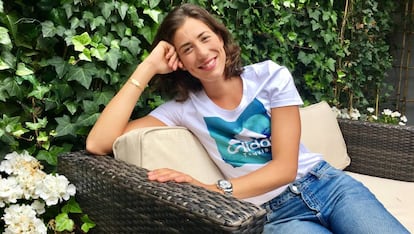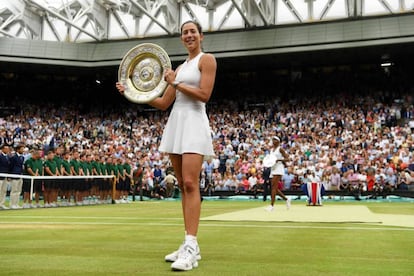Garbiñe Muguruza: “You need to be a bit of an actress on the court”
The new Wimbledon champion talks to EL PAÍS about her latest victory and the difficult year that preceded it

It is 11am in London and Garbiñe Muguruza, 23, welcomes EL PAÍS into a pretty two-story house on Lancaster Road, near the Wimbledon complex. This is the headquarters of IMG, the US multinational that manages the tennis player’s career. Her agent, Oliver van Lindock, can be seen walking around the place, a sleepy look on his face. There is soft music in the background, the smell of coffee in the air, and baskets filled with blackberries and raspberries lying here and there.

Waiting inside a room is the latest Wimbledon ladies’ champion, who has slept about one hour in total after an eventful day that included defeating Venus Williams on the court. She is wearing a white t-shirt and jeans. The night before she was at Cambio de Tercio, a Spanish restaurant in Kensington where, following her victory, she and her friends ordered a plate of jamón ibérico, meat, braised octopus, spicy bravas potatoes and Spanish wines.
Question. After a complicated year with lots of twists, do you feel a bit of a release?
Answer. Release? No, I don’t think that’s the right word. I’m just happy because I’d been working hard and feeling good, and because I’ve managed something big after what happened last year… Again, I’m in a similar situation as when I won Roland Garros, although I am beginning a new period now. Above all, I want to learn from what happened last time, which was neither good or bad, but this time I’m going to try to do it better.
I think I have made a lot of progress, both physically and mentally
Q. You talk about learning. Between your victories in Paris and London, what have you learned, exactly?
A. Last year, when I won in Paris, I thought I would be able to play at the same level at all tournaments. I had very high expectations and I told myself: I need to play like this, because if I play like this I will win everything… The trouble is, you don’t normally play like that, and I got a little bit frustrated, so this year my goal is to take things with more humility. Today I was told: after this, it’s very typical to lose in the first round of the next tournament... [laughter]. No, but seriously, I want to deal with this differently, and try to take things more naturally.
Q. You mentioned humility. Does that mean thinking a little less highly of yourself?
A. No. What I need to do is to avoid thinking that, because I’ve won Wimbledon, I’m going to win all my tournaments with the attitude of “this is going to be a cinch.” If I go in with that mindset, I’m going to lose all my games 6-1, 6-1. Tennis is like that. So what I aim to do is to improve in that sense, to be more prudent.

Q. It’s been said of you that you are an irregular player, that you pop up and down. Do you understand where the criticism is coming from?
A. But I’m always being criticized! I always say that those who love me today will hate me tomorrow. It all depends whether I win or lose...If I don’t win, they really tear into me...That’s good in part, but for a long time now I’ve been trying not to listen to those things or pay attention to all that.
Q. These last two weeks you seemed more distant, less spontaneous in your public statements. Have you become less trusting?
A. No, because I’ve always been very talkative, very much about sharing. There was a time when I saw some things and got a bit angry, and told myself: Garbiñe, do not say this, do not say that... But it blew over, because ultimately that’s the way I am, I like to express the way I feel.
I always say that those who love me today will hate me tomorrow. It all depends whether I win or lose
Q. This title is going to raise the bar. You will be expected to win again, immediately. How do you explain to people that that’s really hard?
A. The thing is, every time Garbiñe loses, it seems to be a tragedy. Everyone starts saying: ‘There she goes, losing again!’ But one shouldn’t take things so dramatically, because it’s not such a big deal. I don’t know why people are so mean… [laughs loudly]! No, I don’t know. I think that deep down, it’s a positive thing, because it means that fans have expectations.
Q. You say you don’t think you have changed at all. Don’t you think that this second major might change your life a little?
A. I think I am exactly the same girl I was two or three years ago, when I still hadn’t achieved any of these things. It’s true that winning Wimbledon is special, and you feel it, but when I ask around, people say: no, Garbiñe, no, you haven’t changed…
Q. For such an emotional, intense young woman as yourself, it can’t be easy to repress yourself the way you did during this tournament. How did you turn yourself into a robot?
A. You have to stick everything in a drawer. You need to contain yourself a bit, to keep calm, even to be a bit of an actress at times. Sometimes, out on the court, I need to put on a poker face and pretend to be calm, when I am actually tense on the inside. It’s important, because you have two set points ahead of you and you can lose the game.
Q. This season you have worked harder and better than ever, and yet the prize has been a long time coming. Was it very frustrating?
A. I was quite sad, because this year I trained like never before, and I’ve been set back by injuries... it hasn’t been easy. In any case, I think that I’ve made a quantum leap in terms of training, and that’s a good thing, because I’d been meaning to do that for a long time. I think I have made a lot of progress, both physically and mentally.
I feel like going to the beach! For the last month, my head has been filled with Wimbledon and nothing else
Q. After this success, what are your plans?
A. In the short term I am going to enjoy tonight, buy myself a really pretty dress and next week I will be with my family. I feel like going to the beach! For the last month, my head has been filled with Wimbledon and nothing else, as though nothing else existed. So now I need to get away and relax for a few days. I’ll think about the next tournament after that.
Q. As a parting message, what would you say to tennis fans?
A. Don’t be so cruel to me; I am a player who rises to the challenge at the big moments, but it’s practically impossible to stay up there the entire year.
English version by Susana Urra.
Tu suscripción se está usando en otro dispositivo
¿Quieres añadir otro usuario a tu suscripción?
Si continúas leyendo en este dispositivo, no se podrá leer en el otro.
FlechaTu suscripción se está usando en otro dispositivo y solo puedes acceder a EL PAÍS desde un dispositivo a la vez.
Si quieres compartir tu cuenta, cambia tu suscripción a la modalidad Premium, así podrás añadir otro usuario. Cada uno accederá con su propia cuenta de email, lo que os permitirá personalizar vuestra experiencia en EL PAÍS.
¿Tienes una suscripción de empresa? Accede aquí para contratar más cuentas.
En el caso de no saber quién está usando tu cuenta, te recomendamos cambiar tu contraseña aquí.
Si decides continuar compartiendo tu cuenta, este mensaje se mostrará en tu dispositivo y en el de la otra persona que está usando tu cuenta de forma indefinida, afectando a tu experiencia de lectura. Puedes consultar aquí los términos y condiciones de la suscripción digital.








































